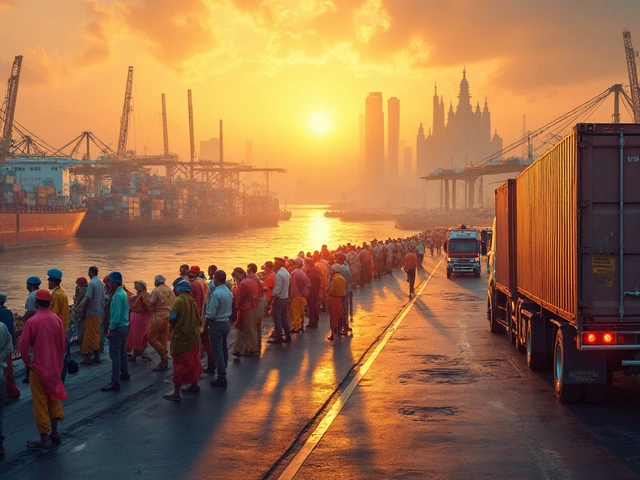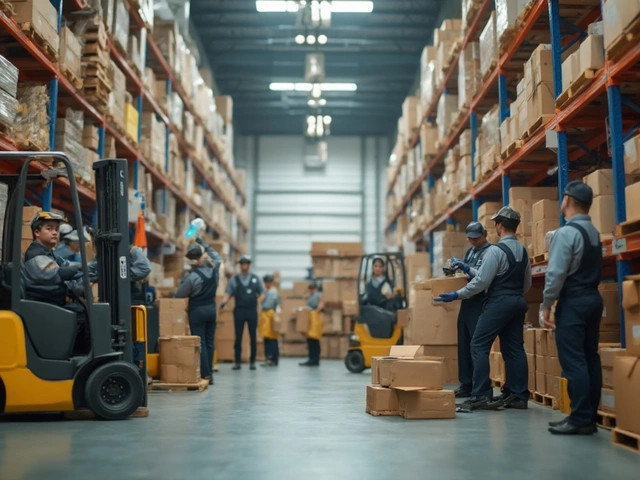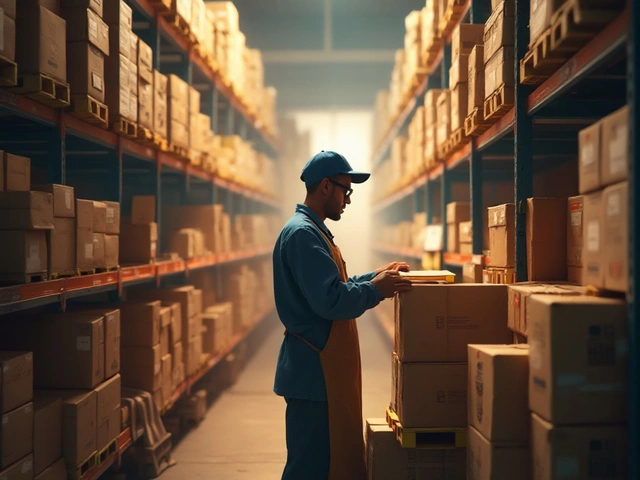If you think all logistics jobs mean sweaty warehouse shifts and stressful delivery deadlines, you’ll be surprised. The logistics industry is massive, bursting with roles for every personality—whether you want a tech-driven office desk, an action-packed warehouse floor, or even to drive the newest electric trucks across Europe. In the UK alone, logistics employs over 1.8 million people; globally, the sector is worth more than £7 trillion and growing. So, naturally, finding the best logistics company to work for isn’t just about the paycheck—it's about culture, work-life balance, real career growth, and whether you’ll actually enjoy your workday.
What Defines a Great Logistics Employer?
Let’s get real: a job isn't worth much if it’s dragging you down. So what separates standout logistics employers from the sea of mediocrity? Three big things always rise to the top—training and growth chances, fair treatment, and flexibility. Top firms spend a lot on staff development; think sponsored HGV licenses, access to supply chain certifications, and even routes into management. You’ll often hear about DHL's “Certified International Specialist” program or Kuehne+Nagel’s robust graduate schemes. The aim? Never let employees stagnate.
Then there's company culture. At the giants—like FedEx, DPD, or Maersk—people talk about feeling supported, not micromanaged. Staff at GXO or Wincanton often mention open feedback channels and line managers who actually help, not hassle. Some firms go all-in on diversity and mental health, offering things like confidential helplines and regular wellbeing check-ins.
Flexible working is another headline act since 2020. Logistics needs people 24/7, so companies now offer a mix of hybrid office roles, part-time driver schedules, condensed working weeks, and even “job sharing.” XPO Logistics and Amazon have pushed creative shits so parents and carers aren’t left behind. The days of one-size-fits-all are fast disappearing.
Don’t forget the practical extras: strong pay, clear bonus structures, pensions, and company vans for drivers. Some employers even throw in share options, free meals, or fitness subsidies. Want something quirky? UPS’s UK offices host “bring your dog to work” days, and DSV recently trialled four-day weeks for operations teams. Who knew logistics was so lively?
Here’s one thing that rarely makes the headlines but matters most: safety records. Companies with gold-standard safety—like DHL and Gist—rarely see accidents, and staff notice when risk is taken seriously. Staff surveys on Glassdoor and Indeed show word gets around: staff morale is always higher at companies that value people over speed at all costs.

Top-Rated Logistics Companies: Real World Inside Stories
Now, what are the names that get employees raving? You’d expect to see the heavy hitters: DHL takes the crown for most “Great Place to Work” awards in logistics—plus, they made the Financial Times Top 100 Diversity Leaders this year. DHL Express in the UK stands out for lightning-fast promotions; many warehouse operatives reach supervisor within two years, and the company’s tuition reimbursement scheme covers business degrees. They’re also carbon-neutral by 2035, so if you care about green jobs, this one’s a winner.
Another big player: FedEx. The company gets glowing feedback for job security, regular pay rises, and industry-best safety standards. Want your weekends off? FedEx’s shift planners claim to offer “life first, work second” as a core value, which former staff confirm on social platforms. Plus, the Bristol depot is known for team socials—trivia nights, summer BBQs, you name it.
Maersk, the Danish giant, has wowed staff with its “mobility passport”—letting you work in several countries over your career. If you’re in for a global adventure, Maersk funds family relocation, language lessons, and even assists with finding schools if you’ve got kids in tow. The company’s digital roles—like logistics analytics and process innovation—get high marks for homeworking and upskilling paths.
Closer to home, Wincanton’s staff praise transparent management and a culture of “no dumb questions.” The company recently invested £5 million in its driver training academy, one of the largest in the UK—good luck finding another firm where new joiners get such attention. Warehouse staff mention recognition schemes like “Colleague of the Month” (with actual cash prizes, not just a handshake).
Let’s not ignore Amazon, controversial as it sometimes is. Their logistics arm provides some of the industry’s highest starting wages and robust employee benefits, including insurance from day one and discounted shares. Staff at Bristol’s fulfilment centre rate the steady hours, ultra-modern tech tools (think robots zooming around), and fast internal progression—essential if climbing the career ladder matters to you. Critics mention pace and targets, but the structure is clear: hit targets, earn bonuses.
Of course, salaries matter. As of 2025, UK logistics drivers working for reputable firms like DPD, Hermes (now Evri), and GXO report average starting pay between £27,000 and £36,000 per year, with overtime and bonuses pushing totals higher. Warehouse leads and transport planners earn even more, especially with companies investing in automation—a growing trend you want to watch.

Pro Tips for Landing the Best Logistics Job
It isn’t just about who you work for—how you approach your job search can make a big difference in finding your sweet spot. The best companies may get hundreds of applications for each opening, so you need to stand out. Customising your CV to match logistics keywords is a must; if a company talks about “continuous improvement” or “lean operations,” don’t just mention them—show what you did in real jobs. Quantify your impact. Didn’t drive trucks or manage fleets? Mention team leadership, meeting tight deadlines, or using warehouse software like SAP or Oracle—skills matter more than job titles.
Interviews often go practical fast. DHL and Maersk like scenario-based questions, such as, “Describe a time you had to manage a late delivery” or “How would you keep calm if a supplier let you down?” Practising for these in advance counts a lot and shows you’re ready for the pressure without losing your head.
LinkedIn is now king for logistics jobs. Follow companies, comment on their posts, and connect with staff in similar roles. Many companies—FedEx and XPO included—share insider job-hunting tips via their socials or even run live Q&A sessions. Taking part can mean hearing about new roles before they're public. Don't be shy to DM an HR manager; you’d be surprised how often it works. If you already know someone inside, score—ask for a referral, which bumps your CV ahead of the crowd at most big firms.
Not sure which role is for you? Test the waters with agency or temp work. Wincanton, GXO, and DPD all bring in temps who later become permanent staff. Getting a foot in the door beats sitting on the sidelines. You’ll see firsthand if the culture is right; if not, you move on with new skills and references. Apprenticeships are another smart entry—Maersk’s UK sites, for example, doubled their apprenticeship intake in 2025, covering everything from supply chain IT to heavy vehicle mechanics.
A final big tip: Read real employee reviews, not just shiny career pages. Platforms like Glassdoor, Indeed, and even Reddit threads (the r/LogisticsUK group is brutally honest) offer unfiltered feedback. Look for patterns—“supportive management” isn’t a fluke if fifty people mention it. Areas like safety, work-paced stress, sick pay rules, and promotion chances all come up again and again.
To really clinch your choice, ask about trial shifts or induction days. Some companies let you shadow a shift before saying yes. It’s the easiest way to tell if a place is fast-paced fun—or run by clipboard tyrants. Bring your best questions: “How are schedules set?” “What does a strong performer look like here?”—the best employers will answer with pride and detail.
The UK logistics job market is wild right now, with new skills (think robotics, data analysis, and green supply chains) changing the game every year. Whichever path you pick, focus on companies that prove they care about training, flexibility, and real listening. You’ll get much more than just a payslip—you’ll get a job you actually want to get up for in the morning.





